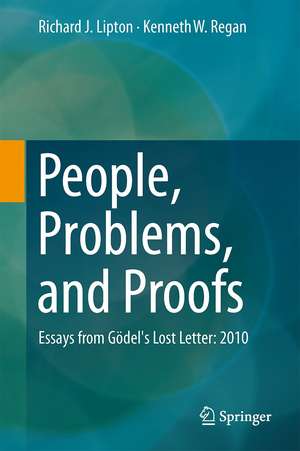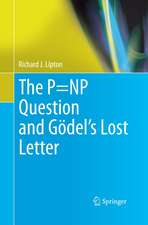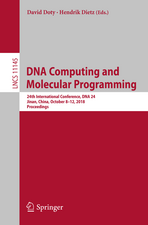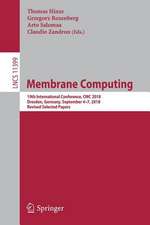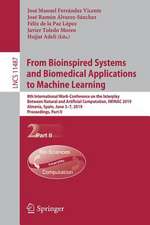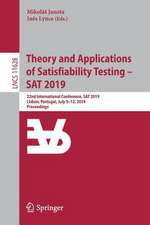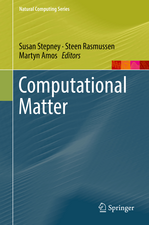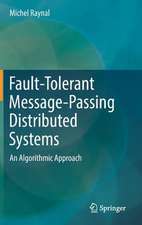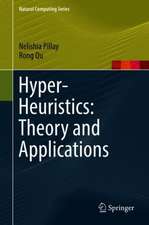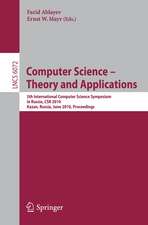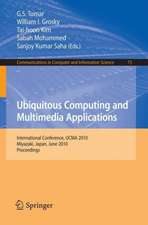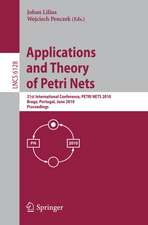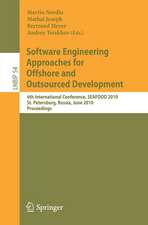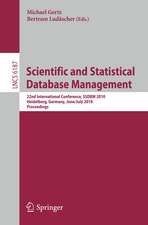People, Problems, and Proofs: Essays from Gödel's Lost Letter: 2010
Autor Richard J. Lipton, Kenneth W. Reganen Limba Engleză Hardback – 27 dec 2013
In this book the authors draw on their outstanding research and teaching experience to showcase some key people and ideas in the domain of theoretical computer science, particularly in computational complexity and algorithms, and related mathematical topics. They show evidence of the considerable scholarship that supports this young field, and they balance an impressive breadth of topics with the depth necessary to reveal the power and the relevance of the work described.
Beyond this, the authors discuss the sustained effort of their community, revealing much about the culture of their field. A career in theoretical computer science at the top level is a vocation: the work is hard, and in addition to the obvious requirements such as intellect and training, the vignettes in this book demonstrate the importance of human factors such as personality, instinct, creativity, ambition, tenacity, and luck.
The authors' style is characterize
d by personal observations, enthusiasm, and humor, and this book will be a source of inspiration and guidance for graduate students and researchers engaged with or planning careers in theoretical computer science.
| Toate formatele și edițiile | Preț | Express |
|---|---|---|
| Paperback (1) | 306.73 lei 6-8 săpt. | |
| Springer Berlin, Heidelberg – 23 aug 2016 | 306.73 lei 6-8 săpt. | |
| Hardback (1) | 311.01 lei 6-8 săpt. | |
| Springer Berlin, Heidelberg – 27 dec 2013 | 311.01 lei 6-8 săpt. |
Preț: 311.01 lei
Preț vechi: 388.76 lei
-20% Nou
Puncte Express: 467
Preț estimativ în valută:
59.51€ • 63.64$ • 49.62£
59.51€ • 63.64$ • 49.62£
Carte tipărită la comandă
Livrare economică 18 aprilie-02 mai
Preluare comenzi: 021 569.72.76
Specificații
ISBN-13: 9783642414213
ISBN-10: 3642414214
Pagini: 333
Ilustrații: XVIII, 333 p. 33 illus., 5 illus. in color.
Dimensiuni: 155 x 235 x 25 mm
Greutate: 0.61 kg
Ediția:2013
Editura: Springer Berlin, Heidelberg
Colecția Springer
Locul publicării:Berlin, Heidelberg, Germany
ISBN-10: 3642414214
Pagini: 333
Ilustrații: XVIII, 333 p. 33 illus., 5 illus. in color.
Dimensiuni: 155 x 235 x 25 mm
Greutate: 0.61 kg
Ediția:2013
Editura: Springer Berlin, Heidelberg
Colecția Springer
Locul publicării:Berlin, Heidelberg, Germany
Public țintă
ResearchCuprins
The Claimant, the Readers, and the Crowd.- Kenneth Iverson: Notation and Thinking.- Edmund Hillary: Proofs and Mountain Climbing.- Leonardo da Vinci: Proofs as Art.- Michael Atiyah: The Role of Proof.- Subhash Khot: Unique Games Conjecture.- Arno van den Essen: An Amazing Conjecture.- Richard Hamilton: Group Efforts.- Grigori Perelman: A New Clay Problem.- Eric Allender: Solvable Groups.- Enrico Bombieri: On Intuition.- Fred Hennie: Lower Bounds.- Volker Strassen: Amazing Results.- Adam Smith: Dumb Channels.- Georg Cantor: Diagonal Method.- Raymond Smullyan: The Reals Are Uncountable.- William Tutte: Flow Problems.- Basil Rathbone: Writing a Major Result.- Elwyn Berlekamp: Dots And Boxes.- David Johnson: Galactic Algorithms.- Warren Hirsch: Guessing The Truth.- Shimon Even: A Promise Problem.- Matei David: Improving Noam Nisan’s Generator.- Ryan Williams: A New Lower Bound.- Joel Seiferas: More on the New Lower Bound.- Victor Klee: Big Results.- George Dantzig: Equations, Equations, and Equations.- Srinivasa Ramanujan: The Role of Amateurs.- John Rhodes: Approaches to Problems.- John Nash: Connections.- Chee Yap: Computing Digits of π.- Henri Lebesgue: Projections Are Tricky.- Nina Balcan: A New Model of Complexity.- Sam Buss: Bounded Logic.- Anton Klyachko: Car Crashes.- Bernard Chazelle: Natural Algorithms.- Thomas Jech: The Axiom of Choice.- Alfonso Bedoya: Definitions, Definitions, and Definitions.- Hartley Rogers: Complexity Classes.- Ron Fagin: Second Order Logic.- Daniel Lokshtanov: Knapsack Problem.- Albert Einstein: Beyond Polynomial Equations.- Denis Thérien: Solvable Groups.- Andreas Björklund: Hamiltonian Cycles.- David Hilbert: The Nullstellensatz.- John Hopcroft: Thinking out of the Box.- Dick Karp: The Polynomial Hierarchy.- Nick Howgrave-Graham and Antoine Joux: Attacking the Knapsack Problem.- Hedy Lamarr: The Role of Amateurs.- Nicolas Courtois: The Linearization Method.- Neal Koblitz: Attacks on Crypto-systems.- Richard Feynman: Miracle Numbers.- Patrick Fischer: Programming Turing Machines.- Roger Apéry: Explaining Proofs.- Ron Rivest: Mathematical Gifts.- Frank Ryan: The Quarterback Teaches.- Leonard Schulman: Associativity.- Paul Seymour: Graph Minors.- Alfred Tarski: Lower Bounds on Theories.- Ken Thompson: Playing Chess.- Virginia Vassilevska: Fixing Tournaments.- Arkadev Chattopadhyay: Computing Modulo Composites.- Charles Bennett: Quantum Protocols.
Recenzii
“The book has 63 chapters, each one … representing an edited version of a post in GLL. … this book will appeal to readers seeking an insider view on how creative mathematical ideas emerge. And it will also appeal to experts for its insightful ruminations on current scientific and cultural problems in theoretical computer science.” (Marius Zimand, Mathematical Reviews, June, 2015)
“This book is one of those inspiring books that almost every computer scientist should read. Moreover, it is also very well suited to a wider audience, including those curious about the field and newcomers. Its authors, Lipton and Regan, did a wonderful job introducing and analyzing important problems in complexity theory with an easy-to-read text. … It is therefore an invaluable source of inspiration and study.” (Carlos Linares Lopez, Computing Reviews, August, 2014)
“This book is one of those inspiring books that almost every computer scientist should read. Moreover, it is also very well suited to a wider audience, including those curious about the field and newcomers. Its authors, Lipton and Regan, did a wonderful job introducing and analyzing important problems in complexity theory with an easy-to-read text. … It is therefore an invaluable source of inspiration and study.” (Carlos Linares Lopez, Computing Reviews, August, 2014)
Notă biografică
Richard Lipton is the Storey Professor of Computer Science at Georgia Institute of Technology; previously he held faculty positions at Yale University, the University of California at Berkeley, and Princeton University. His research is focused primarily on the theory of computation, where he has made seminal contributions. He is a member of the National Academy of Engineering, an ACM Fellow, and a Guggenheim Fellow. Kenneth Regan is a professor of computer science at The State University of New York at Buffalo. His research interests include computational complexity. He is an international chess master and an expert on investigating cheating in chess.
Textul de pe ultima copertă
People, problems, and proofs are the lifeblood of theoretical computer science. Behind the computing devices and applications that have transformed our lives are clever algorithms, and for every worthwhile algorithm there is a problem that it solves and a proof that it works. Before this proof there was an open problem: can one create an efficient algorithm to solve the computational problem? And, finally, behind these questions are the people who are excited about these fundamental issues in our computational world.
In this book the authors draw on their outstanding research and teaching experience to showcase some key people and ideas in the domain of theoretical computer science, particularly in computational complexity and algorithms, and related mathematical topics. They show evidence of the considerable scholarship that supports this young field, and they balance an impressive breadth of topics with the depth necessary to reveal the power and the relevance of the work described.
Beyond this, the authors discuss the sustained effort of their community, revealing much about the culture of their field. A career in theoretical computer science at the top level is a vocation: the work is hard, and in addition to the obvious requirements such as intellect and training, the vignettes in this book demonstrate the importance of human factors such as personality, instinct, creativity, ambition, tenacity, and luck.
The authors' style is characterize
d by personal observations, enthusiasm, and humor, and this book will be a source of inspiration and guidance for graduate students and researchers engaged with or planning careers in theoretical computer science.
In this book the authors draw on their outstanding research and teaching experience to showcase some key people and ideas in the domain of theoretical computer science, particularly in computational complexity and algorithms, and related mathematical topics. They show evidence of the considerable scholarship that supports this young field, and they balance an impressive breadth of topics with the depth necessary to reveal the power and the relevance of the work described.
Beyond this, the authors discuss the sustained effort of their community, revealing much about the culture of their field. A career in theoretical computer science at the top level is a vocation: the work is hard, and in addition to the obvious requirements such as intellect and training, the vignettes in this book demonstrate the importance of human factors such as personality, instinct, creativity, ambition, tenacity, and luck.
The authors' style is characterize
d by personal observations, enthusiasm, and humor, and this book will be a source of inspiration and guidance for graduate students and researchers engaged with or planning careers in theoretical computer science.
Caracteristici
Unique breadth of examples from the history of computer science and mathematics Offers tips and inspiration to graduate students Authors very experienced at communicating the essence of difficult problems Includes supplementary material: sn.pub/extras
